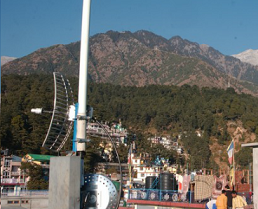Rural BroadBand Bringing Internet To The Indian Countryside

The technology gap that exists around the world is perhaps most exaggerated in India, where a recent technology boom has accelerated an upper/middle class move into 21st century connectivity while many of the close to 750 million rural Indians remain fixed in a pre-internet era. Reasons for this, of course, are clear: setting up internet infrastructure in rural communities is simply not economically attractive. Yet in a tech-driven economy, access to these means of productivity is becoming an increasingly important aspect of remaining a competitive member of the labour force. If India hopes to achieve growth and development that is equitable, it will be important to address the challenge of expanding access to technologies that facilitate social mobility.Rural Broadband Pvt. Ltd. (operating under the name AirJaldi) is one social enterprise that is helping forge the way to this level playing field by providing high-quality broadband to rural areas at affordable rates. Established in Dharamsala, the company designs, installs, owns, and operates network infrastructure to expand the reach of internet into the Indian countryside, and to close the technology gaps that disadvantage many rural communities.
We recently connected with Mr. Alok Gupta, co-founder and Director of Airjaldi, to learn more about his company and to get his insight on the importance of providing internet connection to rural India. Exerpts:
SocialStory: According to the Internet and Mobile Association of India (IAMAI), only 2% of rural India has access to the web when almost 70% of India’s 1.2 billion populations live in rural India. How is Rural Broadband working to bridge this “digital divide” as you progress to fulfill your vision to give affordable wireless connectivity to the rural population?
Gupta: Rural India is the Real India, and rural opportunities are attracting several businesses ranging from retail players, to banking and financial services, to mobile companies to invest and seek their next growth engines. The social sector players and government agencies are also putting thrust to address the rural citizen with several development programs. However, internet is still a rare commodity. Rural Broadband (RBB) is building internet roads and posts (wireless network backbones and end points) in the hard to reach areas where several types of vehicles (internet enabled applications) can apply.
Our talented research and experienced operation teams have put enormous efforts into designing and building customised gear that can take the wear and tear of the rough and tough rural conditions. Our internet roads are also self lighted, in the sense that we tap abundantly available solar energy to power our network backbones and end equipment so that we are not solely dependent on the availability of power in a rural area.

SS: There has been skepticism about the sustainability of social businesses and social business as just a heart-warming idea, but not viable. Yet, you were inspired by social entrepreneurs in this space to develop a sustainable affordable Internet infrastructure model. How would you respond to this skepticism, and how have you ensured you develop a sustainable Internet infrastructure model in rural India?Gupta: There’s a lot of skepticism for anything associated with “social” on sustainability. After all, it’s really hard to attach any meaningful return on investment (ROI) numbers to most social engagements.
Most social businesses or projects begin as pilots and end as pilots, and very few scale or multiply due to lack of sustainability after the initial funding for experimentation.
Our view is that any sustainable rural intervention is complex in nature and needs a combination of clear vision, passion, patience, persistence and more, so it is financially viable and self sustainable when it has to move from pilot to scale. As they say, no lunch is free, and free is not always good!
RBB has been creating and providing internet roads and posts by designing and implementing low cost robust internet technology gear, deployment methodologies, local resources, and capacity building at an affordable price while making reasonable money to sustain and scale this effort.
SS: Rural Broadband provides schools, monasteries and hospitals the ability to utilize the power of the Internet. Can you elaborate more on how you afford to provide these services free of cost?
Gupta: We do not provide free internet services, since internet backbones do not come free!
However, we work closely with reputed social and development sector players and leverage their infrastructure and capacity building initiatives and funding to provide affordable or subsidized offerings to the education or healthcare recipients. Another way we provide subsidized connectivity to these recipients is by sharing/utilising their existing assets such as space, power, and local resources in return for providing affordable internet.
SS: How open do you think rural consumers are to adopting new technology, and what are the hurdles in adoption by these consumers?
Gupta: Introduction of any new technology has always been prioritized by technology companies to be introduced in urban rather than rural areas. There are several reasons and factors behind this prioritization such as purchasing power, desires, aspirations, appreciation for adoption of new technology, availability of power, real use case or applications etc. Some of these factors are real and some have proven to be myths.
In our opinion, appropriateness and affordability of any technology drives its adoption. Growth of voice/mobiles has shown the way. Internet is the next big thing that will improve the life and livelihood of many rural citizens in many ways.
Is there a lot of maintenance required for the solar panels? Also, why did you decide to use solar panels and renewable energy to power the infrastructure of Rural Broadband?
Gupta: Solar panels generally require very little maintenance since there are no moving parts. However they require periodic inspection and cleaning for any dirt or debris that may collect on them, besides of course the replacement of batteries when they run out of life. India has a fairly good solar footprint that provides availability of abundant solar energy if tapped and utilised. As they say, necessity is the mother of invention. Since we found many areas in rural which had no or erratic conventional electric supply, we resorted to an environment-friendly way to light up our internet roads and posts using solar.
SS: To what extent do you think access to Internet can improve rural livelihood?
Gupta: Internet can be the real leveller that can bridge the digital divide in the true sense. Rural citizens can access several advisory, transaction, and collaborative applications in agriculture, banking and finance, education, healthcare, benefits from government schemes, intervention from the social sector, etc., as long as affordable internet access is made available. Traditional methods of information and transactional models are slow and inefficient, while the use of internet can not only provide faster access but also an economical way to reach out and transact with the masses.
What is next for Rural Broadband?
Gupta: In the last few years of our eventful journey, RBB has been experimenting and constantly learning and improving our approach, methodology, and the appropriateness of technology interventions to provide affordable and sustainable internet connectivity. Our vision is to reach out to almost every rural ecosystem player or citizen, enabling them to use and leverage these internet roads and posts to improve their lives and livelihoods. Scaling is the next big thing for us.
SS: Anything else you would like to add to our readers?
Gupta: RBB is a culmination of a vision, passion, perseverance, people, operational excellence and reality check. The organisational DNA which we have built so far is unique and would like to continue growing this responsibly.
Visit Rural Broadband online to find out more, or connect with them on YS Pages.










